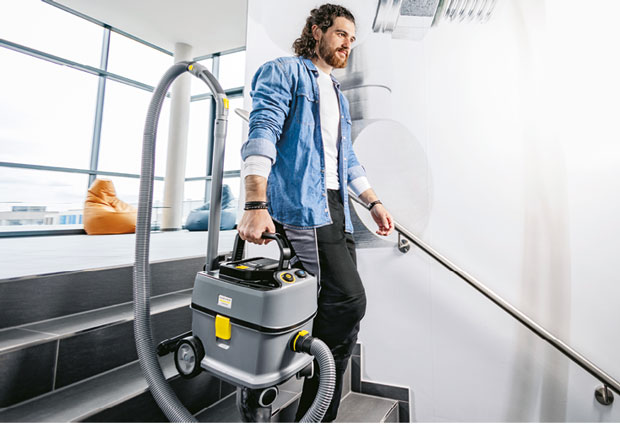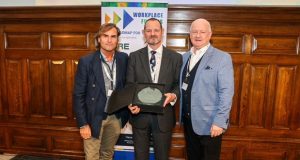 Mark Venner, Chief Operating Officer at Kärcher, discusses why choosing sustainable cleaning products is a non-negotiable for facilities managers
Mark Venner, Chief Operating Officer at Kärcher, discusses why choosing sustainable cleaning products is a non-negotiable for facilities managers
Sustainability and environmental consciousness have permeated our day-to-day lives and is increasingly important to the world of business and by association facilities management.
Within businesses, proactive sustainable action is now recognised as offering a clear competitive advantage. Economic success is measured for long-term strategies focused on people and the environment, and it is facilities managers who play a vital role in eco-conscious adoption. From energy usage and waste handling to water conservation and supply chain management, facilities managers oversee operations, maintenance, and workplace security, influencing the impact an organisation or business has on the environment.
With pressure from consumers, employees and business leaders to act on ESG issues, FMs understand the importance and benefits of implementing sustainable practices. Key to implementing new green practices is ensuring cleaning operations are as eco-friendly as possible.
PROTECTING YOUR BOTTOM LINE
Energy and water consumption represent significant operating costs for businesses, which is why partnering with sustainable cleaning providers is a smart financial decision, as they are deeply rooted in improving energy and water conservation.
Modern eco-conscious cleaning equipment, such as high-efficiency scrubber dryers and vacuums, are designed with eco-efficiency modes in mind, lowering utility bills by up to 30 per cent. Reduced operating costs help facilities managers’ bottom line, making sustainable cleaning equipment a financial and environmental prerequisite.
While the initial outlay for sustainable cleaning equipment may seem higher – often due to the complexity of the production process – the investment pays off in the long run. Sustainable equipment, designed for durability and longevity, reduces replacement rates and extends the equipment lifespan well beyond standard alternatives. As a result, sustainable equipment can last up to 40 per cent longer and companies can avoid replacement cost inflation which has risen by 11 per cent in recent years. This significantly reduces the need for frequent replacements and lowers long-term capital expenditure.
COMPLIANCE WITH LEGISLATION
UK legislation surrounding the environment has a carbon emission goal of net zero by 2030. Regulations such as the Environmental Act 2021 and Climate Change Act 2008, which are pushing the UK towards net zero emissions, place a greater responsibility on facilities managers to commit to sustainable cleaning practices.
For example, the Environmental Act 2021 mandates the implementation of electronic waste tracking systems to reduce poor waste disposal and producers to bear the cost of disposing of products, starting with plastic packaging. This means facilities managers must choose suppliers that adhere to these legislations to reduce potential liabilities.
While our politically turbulent times mean the green agenda is constantly in flux, one thing can be sure: sustainability is something that governments across the world are keen to progress.
Companies proactively moving towards a more sustainable future through investing in sustainable cleaning providers will stay ahead of future legislation, not having to react last-minute, but instead feeling confident in their ability to meet policy changes.
BUILDING FOR THE FUTURE
Old and ill-maintained cleaning products and equipment are known to use harsh chemicals, consume excessive water and energy, and produce large amounts of CO₂ emissions; all practices that negatively affect the environment and corporate ESG goals. By using eco-focused cleaning products, facilities managers can help reduce greenhouse gases, support the wider UK Government’s environmental targets and help create a healthier, less toxic future.
It is advisable to prioritise sustainable practices throughout every level of the supply chain – from raw materials to delivery, with suppliers categorised into tiers based on their position within the chain. This involves embracing recycled, biodegradable, resource-efficient designs across tier one, tier two and tier three suppliers. While many companies focus on tier one and two suppliers, ensuring ethical manufacturing and delivery, tier three suppliers responsible for sourcing raw materials are often overlooked. To truly meet sustainability goals, facilities managers must engage with all supply tiers.
By enacting all the above, alongside working with providers and partners who are invested in the green agenda, facilities managers can build for the future.
FINDING THE RIGHT PROVIDER IS KEY
Partnering with a sustainability-focused cleaning provider can transform cleaning operations through streamlined and efficient equipment, helping to achieve CSR goals.
Kärcher’s brand new modular T-range dry vacuum cleaners are a prime example of innovative technology helping FMs to reach environmental targets. The new vacuums identify the problems surrounding sustainability stated above and offer solutions for FMs to keep costs low, comply with legislation and help improve the environment.
As sustainability becomes an increasingly critical factor in decision-making, businesses will need to evolve with the times or be left behind. Not only do sustainable cleaning solutions contribute to cost reductions, but they also ensure compliance with modern and rapidly changing legislation and supportive action to meet environmental targets.





